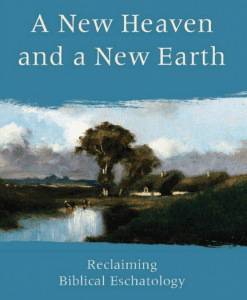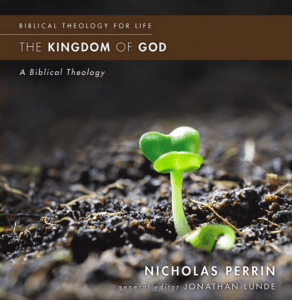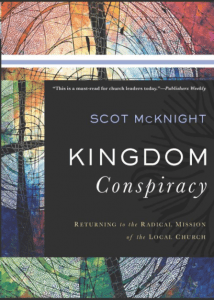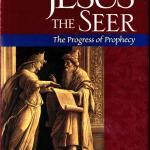 There is a widespread meme at work in how Christian theologians are now talking about the future — about heaven or the new heavens and the new earth or about the final state. It has three parts:
There is a widespread meme at work in how Christian theologians are now talking about the future — about heaven or the new heavens and the new earth or about the final state. It has three parts:
Part A: Most Christians — seemingly all — think they go to heaven when they die and that heaven is a kind of hyper spiritual existence.
Part B: The Bible teaches not that heaven is our final destiny but that it is a (1) new heavens and new earth and (2) it will be on earth, not in the sky in heaven.
Part C: We should care therefore about creation and culture, holistic salvation, if we have a new heavens and a new earth theology of the Age to Come.
N.T. Wright, in his book Surprised by Hope, and now [the focus of this post] J. Richard Middleton, A New Heaven and a New Earth, both illustrate in full argument this two- and three-part contention. They are right and they are in part wrong, and I will do the wrong part first. [Image credit]
Yes for B, in the Bible we find a new heaven and a new earth kingdom and it’s a very earthy vision of cosmic renewal, but (1) this basically means the only two three people in the whole Bible who talk about the new heaven and new earth are Isaiah [and 2 Peter] and John in Revelation. A more sophisticated approach to the NT development is that what Jesus spoke about with the word “heaven” at times refers to The Age to Come and is therefore more or less the same as the new heaven and the new earth. Close readings of both Wright and now esp Middleton reveal that they see the new heaven and the new earth expectation from the prophets on in the Bible. They get this so right.
But I want to pushback just a bit with (2): while at the popular level I think the meme is generally accurate, if one probes below the surface to ask what people expect heaven (rarely framed as new heaven and new earth) to be like leads to a more varied set of expectations. Now to the second point directly: the history of church thinking about heaven reveals a spectrum from a more spiritualized heaven of ecstatic union with God and no or almost no consciousness of others or the environs of heaven to a very new heavens and new earth vision. In other words, Part A of the meme is often (not always) flat out wrong in the history of the church. One look at C. McDannell and B. Lang, Heaven: A History or Gary Scott Smith’s Heaven in the American Imagination reveal that lots and lots, if not most, Christians have imagined heaven in something very like a new heavens and a new earth.
I could add (3): what does “new” mean with “new heavens and new earth”? And how new will it be? The more new the more radical the shift. I have to confess that at times I wonder if what Bible scholars mean by “new heavens and new earth” is not quite like what many lay people mean by “heaven”?
The wildly popular book on heaven by Randy Alcorn (some 700K copies sold) is entirely consumed by this new heaven and new earth theory of heaven. That book is speaking into the very context where both Wright and Middleton are seeing the problem!
So this is no revolution; is the re-emphasis of an old theme. True, nonetheless, and all the more valuable because old!
Part C. Yes, of course, but the fact is that many who had the most spiritual theory of heaven were fully committed to life in the here and now. Making all of culture and state and world “Christian” (as understood) is, after all, the nature of Christian Constantinianism or Christian civilization in all its forms.
Yet, this three-part meme strikes home because so many have experienced it as a primal reality in their Christian nurture. I know I did, and so did Wright and Middleton. So I embrace the meme, with revision and nuance especially in Part A, as valuable for how we talk about Heaven (=new heavens and new earth).
Here’s what Middleton’s very good book (ahem, we don’t agree entirely on kingdom and when I was at Rochester we had a fair enough conversation about this; he has here a Wesleyan approach with sympathies for some dimensions of Kuyperian thinking — Richard clarified where he sits on the spectrum for me) does:
1. It establishes a new heaven and a new earth horizon for biblical eschatology.
2. It demonstrates that redemption in the Bible is holistic (I could take more on ecclesial formation as central to holistic redemption but he’s got the entire cosmos in mind).
3. It shows how realistic, earthy, and embodied the final kingdom is; so the challenge of the kingdom is closer to cultural renewal, activism, and social justice. His OT scholarship orientation provides for us a wonderful set of categories for kingdom hope from the OT prophets (pp. 105-107):
Return to land
Restoration and healing of God’s people in society
Flourishing of the natural world, including peace among the animals
New relationship with the nations, centered in Zion
Forgiveness of sin and a new heart, enabling God’s people to keep the Torah
Restoration of righteous leadership for Israel
God’s presence among the people in the renewed land
4. It flirts a bit with the universalism discussion, though he concludes it is “wishful thinking” (209), and he pokes in the eye those who think there is an intermediate state or a rapture — but all the while keeping his focus clear: a new heaven and new earth kind of final kingdom as the hope of the Christian where there will be cosmic, holistic redemption of all things.
5. It presses home the important point that final judgment has a teleology other than retribution; it is a restoration kind of final judgment.
Middleton provides an important biblical theology of holistic redemption and eschatology, and ought to be used widely in college and seminary classes.















